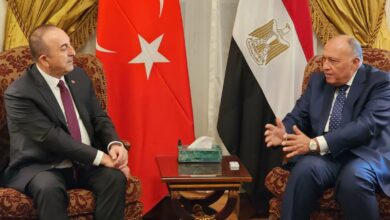Beijing/Delhi — China said on Tuesday that Western air strikes on Libya risked a "humanitarian disaster," adding to the chorus of criticism from big emerging powers over the UN-authorized campaign.
China, with Russia, India, Brazil and other developing countries have condemned the US-led air strikes on Libyan leader Muammar Gaddafi as risky and unwarranted overreaching by the West.
The shared opposition to the Libya campaign could become a point of diplomatic convergence among the "BRICS" bloc of major emerging economies — Brazil, Russia, India, China and South Africa — which hold a summit in south China next month.
But it is unlikely to evolve into united action by this disparate group of countries, with their own mutual rivalries, said Shi Yinhong, a professor of international security at Renmin University in Beijing.
"Undoubtedly, many developing countries see a dangerous precedent in the Western attacks and intervention (in Libya) in what is fundamentally a civil war," said Shi.
"But Russia, China and the others will be afraid of a serious break with the United States or offending the Arab countries, so they won't push their opposition far," he said.
HISTORY OF OPPOSING INTERVENTION
"I think the idea that the BRIC countries would act as a coalition on this is outlandish. They are too deeply meshed with the West to risk a split," Shi added.
Western powers began the strikes against Libya over the weekend in a UN-sanctioned campaign to target air defenses, enforce a no-fly zone and protect civilians from Qadhafi's forces.
India, China and Russia — which, along with Brazil, abstained from last week's UN Security Council resolution — have a history of opposing intervention in sovereign states.
They opposed the US-led campaign over Kosovo in the 1990s, when the Chinese embassy in Belgrade was bombed, and also opposed the US led invasion of Iraq.
Russian Prime Minister Vladimir Putin, compared the campaign in Libya to the Iraq invasion, saying it "resembles medieval calls for crusades.
Brazil's criticisms have been relatively muted. On Monday, it called for a ceasefire in Libya and regretted the loss of life there. Of the BRICS, only South Africa supported the UN Resolution.
China has been among the loudest in voicing opposition.
"We have noted the reports about civilian casualties from the military action against Libya by the countries concerned, and we express our deep concern about this," the Chinese Foreign Ministry spokeswoman Jiang Yu told a news conference in Beijing.
"The original intent of the (UN) Security Council resolution was to protect the security of the Libya's people. We oppose the wanton use of armed force causing even more civilian casualties and an even bigger humanitarian disaster."
She added that French President Nicolas Sarkozy, a strong proponent of the most vocal proponents of the no-fly zone over Libya, will visit China at the end of March to attend a seminar on global monetary reform.
"What is happening in a country, within their internal affairs, no external powers should interfere in it," Pranab Mukherjee, India's finance minister and leader of the lower house of parliament, told lawmakers in Delhi on Tuesday.
"Nobody, not a couple of countries, can take that decision to change a particular regime," Mukherjee said.
The emerging powers could maintain their more united front over Libya in the coming weeks ahead of the BRICS summit in China, said Srinath Raghavan, a senior fellow at the Center for Policy Research in Delhi.
"If there is a serious ceasefire proposal or negotiated settlement, then the BRICS could well jump in diplomatically. They may want to then shape a global consensus if the West's policies get in trouble," Raghavan said.




